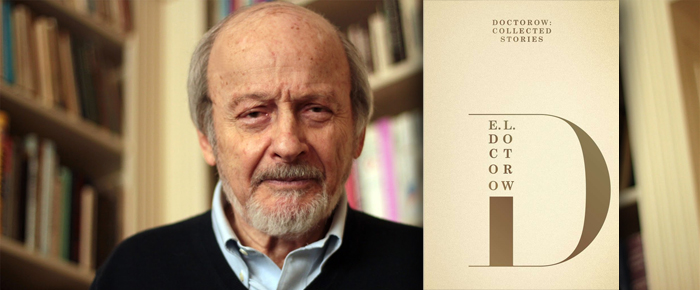
By Heidi Simmons
—–
Doctorow: Collected Stories
By E. L. Doctorow
—–
Oh to be in the hands of a great storyteller!
Readers may be most familiar with the award winning novelist’s bestsellers that include, among many others, Ragtime and Billy Bathgate. Author E. L. Doctorow revisits and revises his favorite narratives in a personally curated short story collection written between the 1960s and the new millennium. Doctorow: Collected Stories (Random House, 336 pages) delivers 15 tales that capture a complex world filled with complicated people.
As my regular readers know, I am a fan of the short story. A well-written, well-told short story is magic to me. And reading an author’s collection is my favorite because the stories often add up to something larger, more thematic, and they provide an insight into the author’s particular voice. Rarely is an entire collection great work, although, treasures do emerge.
From start to finish — all 15 stories — I found myself swept away not only by Doctorow’s writing, but by the stories themselves.
Right out the gate, in the first tale, “Willi,” I was moved and shocked by the boy whose innocence is shattered when he discovers his mother having sex in the barn with a man not his father.
In “Hunter,” a dynamic, young teacher makes the best of her lonely life manipulating her underprivileged students to “love” her.
My favorite, “The Writer in the Family” is about a high school student whose father has died, and his father’s sister asks him to write letters to his grandmother as if his father is still alive and living in Arizona.
“Heist” is the story of a priest who is struggling with his faith when his church is broken into and the large crucifix is stolen from behind the pulpit. The priest fancies himself a sleuth like G. K. Chesterton’s “Father Brown,” and discovers an unlikely kinship with a young Rabbi. This story became a novel under the title City of God.
Doctorow creates a moody, dark and serious world in “The Water Works.” The narrator follows an undertaker to the city’s water works to recover a small child who fell in and drowned. This story was also a novel with the same title.
“Liner Notes: The Songs of Billy Bathgate” is one of the shorter stories in the collection. Besides the novel, it was a major motion picture starring Dustin Hoffman and Bruce Willis. Set in 1930s Bronx, the “Liner Notes” gives us a glimpse into the background of an orphan as he becomes street smart and finds love.
In one short story, we get an entire character’s existence in “Jolene: A Life.” A young girl moves through her life attaching herself to men who want her, that is, until her maturity finally blooms and she becomes her own person.
“Baby Wilson” is about a man who discovers he truly loves his girlfriend after she steals –- kidnaps — a newborn baby boy!
Creepy and dangerous, “A House on the Plains” tells the story of a mother and son who are not afraid to kill those who get in the way of their financial success.
“Walter John Harmon” is about a cult leader who runs away with the narrator’s wife. The narrator soon decides it is all prophetic and takes over the cult.
An FBI special agent must figure out how a boy’s body was found dead at a White House ceremony in “Child, Dead, in the Rose Garden.”
In “Wakefield,” a man leaves his wife by hiding out in the garage attic until he becomes a changed man. However, he only changes after the wife begins to show interest in other men.
“Edgemont Drive” tells the story of a dying man who has comes back to his childhood home to spend his final hours, even though the people living there are total strangers.
A young immigrant gets tangled up with a gang in “Assimilation.”
The final story, “All the Time in the World” is about a retired man who talks to himself as he tries to figure out his increasingly the complicated world and the role he plays in it.
Each story resonated with me and the whole collection felt fresh. The worlds are visceral, the people real and the complications unpredictable.
I like the way Doctorow trusts his reader to pick up the nuances of place and subtle behaviors as characters attempt to figure out their world and the odd situations that are unfolding. This makes the read intriguing on many levels.
The dialogue in this collection is without identifying marks or names. For me, this style adds energy to the stories and captures a rhythm and authenticity of conversations. Only a master writer can take those risks and make it work so well.
Whether a story takes place in the 1930s or 2015, Doctorow taps into a universal human condition that reveals relatable vulnerabilities and desires.
Doctorow was a master craftsman, not with just the written word, but with narrative. He always tells a satisfying story.
I couldn’t help but think that the final story in this book, “All the Time in the World,” (he arranged the stories in the order he wanted them read) was a message from the author about the mystery of life and what we leave behind.
Doctorow passed away in 2015. This collection is a gift to readers and his fans especially if you love short stories.









































